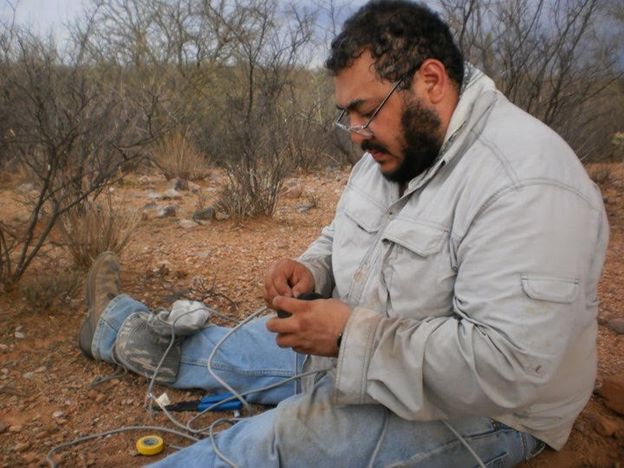This interdisciplinary science has been in the core of my research goals simply because I investigate ecosystem processes in water limited ecosystems. An early realization in my career was that for life, and any biogeochemical cycle, to occur in these systems, water is needed. So, the aim of finding the “functional fate of rainfall” has been central in my thinking and has given me the basis to link hydrological processes with ecosystem production. Ecohydrology also provides knowledge to manage water resources and preserve ecosystems, which are themes that are very relevant in Northwestern Mexico where water is certainly scarce.
What are your undergraduate and graduate degrees in?
I obtained a degree in Biology from the Universidad de Guadalajara in Mexico where I was trained in plant physiological ecology (cacti research). Then I moved to Tucson to get my MS and PhD in Rangeland Management with a minor in Global Change at the University of Arizona (2006). Here is where I succumbed to study seasonally dry ecosystems.
How did you arrive at working in/thinking about ecohydrology?
In my graduate work I was confronted with a very fundamental issue in ecohydrology: How can we partition the evapotranspiration flux into its components without losing coherence to study processes at the ecosystem scale? This simple, yet fundamental, question obligated me to think about soil, plant and atmospheric processed combined and exposed me to modern technology (flux towers, IRGAs, elemental analyzers and mass spects) to trace the water molecule in ecosystems. Thinking about ET in separated terms demands inquiring how is the biology influencing this physical driven flux and what are the consequences for ecosystem production if water moves through the physical or the biological path.
What do you see as an important emerging area of ecohydrology?
There is still room for finding fine connections between the water cycle and other ecosystem processes. For instance, modelling highly dynamic water and carbon fluxes in pulse driven and seasonally dry ecosystems is still very challenging and it is an area that requires profound ecohydrological criteria. I must mention as well that as water scarcity and pollution augments in the planet ecohydrological knowledge should now confront water management issues.
Do you have a favorite ecohydrology paper? Describe/explain.
An ecological paper that transmitted an important hydrological message early in my career was the Laureroth and Sala 1992 (DOI: 10.2307/1941874), where the relationship between rainfall and ecosystem production was highlighted but specially how the space by time substitutions are useful to study and integrate ecohydrological processes, an idea that was later on explored by Huxman et al 2004 (DOI:10.1038/nature02561) with a more explicit argument on how this relationship and the space by time substitution is indeed useful to make synthesis and compare ecosystem processes across ecosystems. As nicely depicted by Biederman et al 2016 (doi: 10.1111/gcb.13222) this is an idea that is worth exploiting as we study ecosystem processes nowadays.
What do you do for fun (apart from ecohydrology)?
I enjoy dealing with the analytical instrumentation in lab; I love to see the machines beeping and LEDs blinking while data comes out; I particularly enjoy opening their guts to see how they work. I still try to go out to the field with my students, but when I go home to be with my wife and our two kids (Tlaloc and Ehecatl a.k.a. the Monsoons), card games after a fine Sonoran steak and red wine are usually in order.

 RSS Feed
RSS Feed